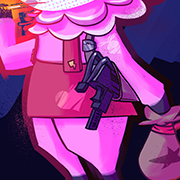|
The audience for Blizzcon is press. The fact that they sell tickets is purely so they can get a bunch of money out of cosplayers.
|
|
|
|

|
| # ? Apr 20, 2024 15:08 |
|
more falafel please posted:The audience for Blizzcon is press. The fact that they sell tickets is purely so they can get a bunch of money out of cosplayers. This is not accurate.
|
|
|
|
All of this (orphaned failure analysis) is ignoring the likely reality that Diablo 4 was supposed to be presented there as well, but had fallen through over the previous years and they were left with a mobile game they needed to promote with a key partner and a not ready to announce or show Diablo 4 https://kotaku.com/sources-blizzard-pulled-diablo-4-announcement-from-bli-1830232246 They even warned that audience that Diablo 4 wouldn't be shown. It's just an awkward situation. All of the "the audience there wouldn't care for it" take is just ignoring reality of exposure and responsibility to their development partner. You can suggest that a different venue may have been better but you're insane if you think they could have convinced anyone that showcasing a title they've dumped considerable resources into should not be mentioned at your personal convention and no one would believe that exposure from the event wouldn't be good without doing it and seeing the result. Of course I think they could have done it better (I like the comment earlier that it should have been done with it ready to play, for instance) but I've got the wonderful gift in hindsight. E: Like seriously the only word to describe not promoting D:I at your own convention would be "sabotage" and if the project failed they'd be sued in a foreign court for exactly that. MJBuddy fucked around with this message at 06:13 on Mar 17, 2021 |
|
|
|
Especially when you are talking about a beloved IP, the people who make decisions about what projects to fund and promote are very often neither familiar with how game development works for the IP or genre, nor are they players of the IP or genre. But they know a lot about market trends and development costs and business models and potential target market demographics. So it ends up being extremely common in the industry for a game to be developed and promoted that, according to my spreadsheet, could be a profitable billion dollar business. But in reality everyone in touch with actual customer desires or actual development mechanics knows it has no shot at succeeding. I have sadly been involved with several of this kind of project, though thankfully not for a while.
|
|
|
|
Skwirl posted:Then all of the coverage would have been about Diablo 4 being officially announced and not the actual game they were trying to promote. Sure, but well before D4 releases or there's any other news, you'd want to be able to fill that gap with Immortal news while people had less of a gut reaction. The problem is that I believe regional Soft Launches only started last year and Immortal was announced in 2018 , which is ridiculously early for a mobile game. I think a lot of companies want to try and do what Bethesda did with Fallout Shelter, but without knowing how phone announcements work.
|
|
|
|
DancingMachine posted:....So it ends up being extremely common in the industry for a game to be developed and promoted that, according to my spreadsheet, could be a profitable billion dollar business.... Ideally any title sits in the perfect trifecta of “is an idea the team want to develop”, “is an idea the team is capable of developing”, and “is an idea worthy of developing”. But more often it’s a case of pick two.
|
|
|
|
MissMarple posted:I’d argue the inverse is even more common; games developed where the team top to bottom absolutely love the IP and/or genre, but there is absolutely no business case for it to exist. The difference is that the former mistake is more commonly made with a lot of advertising behind it, and the latter without. Wow, you've effectively described a problem I've seen so much but couldn't quite put my finger on in a couple of sentences. This is so accurate it hurts. To expand on this, 'Magic' from a team usually comes from a team caring enough about their product to put in stupid amounts of hours and effort to make it as good as they can. It's the kind of work ethic that could never be borne from any compensation package and has to be conceived from what is probably an unhealthy obsession with the artistic side of the project. Something about that product means something to you or the team and so more and better work gets done. For me personally, I'd estimate the difference between my work when I care about what I'm working on vs when I'm annoyed at the project or it's leadership is literally an order of magnitude. My best work ever actually has come out of 4 - 8 week megabursts of motivation where projects I've toiled on for a year seem like they aren't nearly as complete or as polished. That is where 'developer magic' comes from and as best as I can tell, it's seems to be nearly a universal constant in creative industries. This, of course, is not news to most I'd imagine, but what is surprising to me is that I'm frequently on a team that fails to leverages this. You can mitigate risk by restricting creative control over a product, or by forcing a lot of analysis and documentation on the person building the thing, but in doing so, you are also diminishing their fucks to give. By just letting someone loose on something they already care about, you certainly are taking on more risk, but the upper limit of that work is so enormously high, I have to believe it's worth it if you truly believe your team competent. Canine Blues Arooo fucked around with this message at 10:07 on Mar 17, 2021 |
|
|
|
Number of hours worked per person per week is not a metric that has a linear correlation with the quality of the final work.
|
|
|
|
leper khan posted:Number of hours worked per person per week is not a metric that has a linear correlation with the quality of the final work. 100% this. 'Magic' from a team usually comes from a team caring enough about their product to put in is more accurate
|
|
|
|
You know, it's interesting. The project that I was creative lead on was most certainly the one I felt I've been most productive on in my career. On the other hand, it was also the project that stressed me out the hardest. But the worst times of stress had nothing to do with hours at the office - in fact, we were working 7 hour days for most of it. Even when we "crunched", that typically meant 8 hour days with a smattering of 10 hour days that weren't mandated, but people took it upon themselves to do anyway (self included - and we were compensated for it). The mention above of very productive 4-8 week mega-bursts also resonates with my experience - sometimes you just get this unusual clarity of vision and implementing it becomes easy, and somehow inherently rewarding. That doesn't always happen, especially when you feel distanced creatively from a project. I think it's true that one of the greatest predictors of a game's quality is how strongly the developers feel about it. But it's not the only one, and it's also a risky one, because we can get tunnel vision and force through something that makes sense to us but our customers hate. That's not a situation you're going to win if you want to put bread on the table at the end of the day. Hyper Crab Tank fucked around with this message at 12:39 on Mar 17, 2021 |
|
|
|
I think that what makes the alignment of developer interests and game design so empowering is that the developers will have internalized what makes that kind of game good. You don't have to have your directors constantly micromanaging mechanics and artwork because the people making the game get it. That reduces the number of iterations everything takes, giving more time to work on content or polish.
|
|
|
|
Just wanted to thank everyone for chiming in on what I ignorantly thought would be a very simple and nearly redundant question. I'm surprised that there are such different views on it from people inside the industry and I've really learned a lot from reading the last page or so of discussion.MissMarple posted:I'd argue the inverse is even more common; games developed where the team top to bottom absolutely love the IP and/or genre, but there is absolutely no business case for it to exist. The difference is that the former mistake is more commonly made with a lot of advertising behind it, and the latter without. I worry that the group that broke from blizzard to form Frost Giant is going to run into this. I love RTS (and especially the prototypical 'blizzard RTS') but I worry that myself and the 17 other middle aged people that feel this way aren't going to be enough to make their project successful. I bolded a section of this quoted post - Do you people think it's possible for shareholder-backed production teams to hit all three of these? I feel like the involvement of shareholders in creative enterprises such as the production of media serves to limit the amount of risk the producers are willing to take, and that must always affect how interesting to the dev team the ideas are, and maybe how worthy of development the project becomes. I suspect the opposite is true the smaller the organization is - a small team of self-selected passionate indie people are maybe more likely to have unique risky ideas that could be very successful or could fall flat. In the case of the big shareholder-associated annual sequel AAA games (Battlefront/CoD, Madden, etc) I guess all three points are satisfied. You have a team of people who are already working on these projects, are comfortable in the space artistically and with the tools they use, are demonstrably capable of producing a good product, and are happy to keep churning out the product in an iterative fashion so that they can pay their mortgage, build their portfolios, move into management and hire new graduates, etc. Maybe shareholder involvement improves these types of projects by enabling the onboarding of a large enough team and the budget for the marketing, but hurts the development of new IP by limiting risktaking?
|
|
|
|
In my experience, the only time shareholders give 2 shits about what the company is developing is when one or more of those 3 points has already been missed and it shows up in the revenue numbers.
|
|
|
|
Oh hey, Q1 earnings must be due https://www.ign.com/articles/activision-blizzard-has-reportedly-laid-off-nearly-190-employees
|
|
|
|
Hughlander posted:Oh hey, Q1 earnings must be due https://www.ign.com/articles/activision-blizzard-has-reportedly-laid-off-nearly-190-employees Hey, at least they're providing for them. https://twitter.com/HardDriveMag/status/1371940238856228868?s=20
|
|
|
|
Skwirl posted:Hey, at least they're providing for them. Well having been laid off in the one 2 years ago it's actually a pretty sweet severance package. 90 days of employment, and I think two weeks per year with the company severance, spring bonus fully paid out, and COBRA coverage for 60 days after the 90 days. The layoff was in Feb, and it was end of August when I'd 'miss' my first pay check. So I took my time fixing up the resume and being really choosy about the job and pocketed a huge chunk of change.
|
|
|
|
Yeah I don't think I could handle the yearly Activision purge but 90 days isn't bad.
|
|
|
|
more falafel please posted:The audience for Blizzcon is press. The fact that they sell tickets is purely so they can get a bunch of money out of cosplayers. VelociBacon posted:I worry that the group that broke from blizzard to form Frost Giant is going to run into this. I love RTS (and especially the prototypical 'blizzard RTS') but I worry that myself and the 17 other middle aged people that feel this way aren't going to be enough to make their project successful.
|
|
|
|
OneEightHundred posted:OTOH dropping a solid product into a "dead" niche and dominating the market when the niche expands has been a common story as of late. As far as I can tell, the two most common routes to indie success are to trade heavily on nostalgia, or to invent or revive a genre/genre mashup. "What if X but with Y" is a common design methodology.
|
|
|
Angryhead posted:People Make Games made a really good video on the topic of outsourcing and how huge modern AAA teams are: I’m the kind of weirdo that watches the credits to get a feel for how the project was structured. Always keep an eye out for Volt services in MS studios titles. Marvel movies feel like 80% outsourced labor
|
|
|
|
|
The outsourcing industry is entirely hosed. I don't know how you fix it, unionization doesn't help in countries with lax labor laws. I'm the weirdo who reads the credits because there's almost always someone I know in there, but I guess that and a travel pillow thanking you for your crunch hours is what you get from 15 years in this industry
|
|
|
|
I've shipped a few titles where I was basically the only person at our studio that worked on it (small ports where I did the code and production) but you better believe that when I alter the credits I put my entire studio in there so everybody has a chance to see their name in a Sonic game or whatever. I can't imagine I'm the only one who does this 
|
|
|
|
I read along to credits of big AAA games because it's one of the few places you can see an org chart of our peers around the industry and where they put our types of people, or if they use redundant specialist layers, etc. You can't really outsource us (yet) despite products that keep rolling in that really want to lie about their ability to do so, so it's hard to bury that type of info out of the credits.
|
|
|
|
I’m a developer (Software Engineer, technically, but that title doesn’t really mean much). That means I do both programming and architecture/design, which has mostly been in the context of applications that just so happen to be deployed on the web. Game dev, from what I can tell, requires a very different set of technical skills and works with very different problem domains. Would the skills I have built as a developer on non-game applications transfer at all to game dev, or would I be starting from scratch?
|
|
|
|
Pollyanna posted:I’m a developer (Software Engineer, technically, but that title doesn’t really mean much). That means I do both programming and architecture/design, which has mostly been in the context of applications that just so happen to be deployed on the web. Game dev, from what I can tell, requires a very different set of technical skills and works with very different problem domains. Would the skills I have built as a developer on non-game applications transfer at all to game dev, or would I be starting from scratch? I'm working at the moment, so can't really effort post right now, but I wouldn't say it would be completely starting over. Data structures and algorithm knowledge, task planning, etc. are all still important. Some differences would be we tend to be more focused on performance since we need to do tons of stuff 60+ times per second, and also many places don't do much in the way of unit testing. We also iterate quickly since a large part of game development is experimenting to figure out what is actually fun, since you usually don't really know going in. It's also worth mentioning that many game companies, especially multiplayer focused studios will have server and web teams that might provide a migration path for your skill set, and there's also stuff like DevOps. It's reasonably easy to pick up something like Unity or Unreal Engine if you want to just play around with the idea and see if you find it interesting.
|
|
|
|
I’m no stranger to tight iteration loops, hell my response in the retro for the Big Project we just deployed was all about how we should have started those loops sooner. Performance is something that I’ve been a bit lacking in historically since I’m mostly self-taught, but it’s been really important toe recently cause of the system we just replaced, so I’m catching up quickly (we use Go at work). Plus, I‘be never had problems figuring out profiling tools, so at the very least I can track down what problems exist and how to tackle them. A relatively low emphasis on unit testing I guess makes sense because of your point on experimenting a lot. Sounds like there’s options for me! I’d still like to tinker in Unity a bit, but I don’t quite have a mind for game design yet, so it’ll prolly be of questionable quality.  Thanks for the response!
|
|
|
|
Pollyanna posted:I’m a developer (Software Engineer, technically, but that title doesn’t really mean much). That means I do both programming and architecture/design, which has mostly been in the context of applications that just so happen to be deployed on the web. Game dev, from what I can tell, requires a very different set of technical skills and works with very different problem domains. Would the skills I have built as a developer on non-game applications transfer at all to game dev, or would I be starting from scratch? Don't overthink it. There's tons of gamedevs who have less experience than you do; the main skill they have over you is a willingness to dive in without having done extensive preparation and training first. Download an engine (Unity, Godot, Unreal Engine, and Game Maker are all popular) and get started.
|
|
|
|
Pollyanna posted:I’m a developer (Software Engineer, technically, but that title doesn’t really mean much). That means I do both programming and architecture/design, which has mostly been in the context of applications that just so happen to be deployed on the web. Game dev, from what I can tell, requires a very different set of technical skills and works with very different problem domains. Would the skills I have built as a developer on non-game applications transfer at all to game dev, or would I be starting from scratch? I think I've said this before to you but I'll add it again. Game Dev is such a mind boggling big super large umbrella. There's no single answer. If you were to work on back-end engineering on a massively multiplayer real time synchronous gameplay mobile game, then your work would look almost exactly like doing web dev. A standard interview question for that role is basically "Design this feature that will use a database for storage" and talk through caching, concurrency issues, player UX responses etc... On the other hand if you're looking to make Flappy bird and wanted to only do client gameplay and physics, then yes that's different. Because games don't need to be 'correct' they need to feel fun. Which is often two totally different things. "OMG Delta v of flappy bird is so unrealistic! I could do a much better simulation!" misses the point that it's not supposed to be realistic it's supposed to be fun through frustration.
|
|
|
|
Hughlander posted:I think I've said this before to you but I'll add it again. Game Dev is such a mind boggling big super large umbrella. There's no single answer. If you were to work on back-end engineering on a massively multiplayer real time synchronous gameplay mobile game, then your work would look almost exactly like doing web dev. A standard interview question for that role is basically "Design this feature that will use a database for storage" and talk through caching, concurrency issues, player UX responses etc... Oh poo poo, I posted about this before, didn't I? Lemme go look for previous responses 🙇♀️ That definitely makes sense, and it's what I was getting at with "different problem domains". In which case, it's just about the problem domain itself, and you'll always gonna to just start gaining experience in it. Fair enough! Been a few years since I checked out Godot. I remember it being pretty cool; if it's gotten further, I'll def check it out!
|
|
|
|
more falafel please posted:The outsourcing industry is entirely hosed. I don't know how you fix it, unionization doesn't help in countries with lax labor laws. OneEightHundred fucked around with this message at 18:42 on Mar 30, 2021 |
|
|
|
I'd like to ask: What is a video game engine? The old adage of "Pick the right tool for the right job" applies to a lot of things, but from a non-engineer/non-programmer perspective, software kinda blurs that line between right tool and wrong tool, especially video game development software. There's certainly distinct brands: Unreal, Unity, CryEngine, Frostbyte, Source. And you have smaller engines built to purpose for distinct game genres, like RPG Maker. An engine's functionality varies, and both marketing and critics would say each engine has their strengths and their weaknesses. Those capabilities shape a general feature list of what's possible out of the box, but then we have devhouses making both minor tweaks and even major changes to the capabilities of that engine. But at a certain point, the engine you chose cannot do everything, and even with the widening talent pool of programmers and engineers building your own engine is not just a risk but also potentially a dead end too. Which is why I'd like to ask more specifically: What are the key components that make up a baseline video game engine? What is it about these components that allow the various game engines out there to be distinct from each other in capability?
|
|
|
|
I guess, the editor, deployment targets (you know, PC, console, web, mobile), license terms, renderer and physics subsystems?
|
|
|
|
If you look at the table of contents of the book Game Engine Architecture (https://www.gameenginebook.com/toc.html), you can see an overview of many of the components of what's usually considered the "engine" of a game. Basically, it's the stuff that you build on top of to make a game. It's frequently - but not necessarily - resusable between multiple projects. There are multiple ways to do pretty much everything in that list, each with their own tradeoffs in performance, usability, etc. Different engines do each of them differently. Some engines, such as Unity and to a somewhat lesser extent Unreal (it's FPS heritage really shows sometimes), attempt to do these things in a way that will be "good enough" for most types of games. This genericity is a bit of double-edged sword. It lets you make pretty much anything, but it can add unnecessary bloat, complexity and overhead. Sometimes this matters, sometimes it doesn't. For any given game, you will likely know more about your specific requirements. If you have the time, manpower and ability, a custom game engine can be better optimized for exactly what you need to do. It can also streamline your workflow to your specific use cases. Another valid reason people will make custom engines is control. When using any third-party product you are limited in various ways. You have to abide by their license agreements, work with how and when they choose to implement features or fix bugs, etc. This may or may not be worth dealing with. The line between game and engine can be pretty blurry sometimes. There's some systems that are generally reusable for any game type, such as basic containers, algorithms, graphics, audio and input systems, etc. There are other bits that are more game-specific, but could still be reused if you make something similar to this game. Then you have the stuff that is ultra-specific to one game and maybe reusable to some degree in something like a direct sequel. Edit: Ah, the Game Engine Architecture site also has a diagram of various engine components from the book that I was wanting to show: https://www.gameenginebook.com/figures.html. Basically, things higher up in that diagram are built on the things below. Different engines do all these things differently, or sometimes not at all if a given game doesn't require some of it. chglcu fucked around with this message at 09:29 on Apr 7, 2021 |
|
|
|
chglcu posted:The line between game and engine can be pretty blurry sometimes. In practice, the definition is pretty much "a collection of code re-used across multiple games, and ship to users," i.e. I think in most contexts, the tools aren't really considered part of the engine, but middleware dependencies usually are... but really the point where the engine stops and the game begins is the parts that weren't reused later, and can include, and frequently has included, a LOT of game logic. It's more realistic to talk about game architecture in terms of components than to try finding a line of separation in those components between the engine and game. OneEightHundred fucked around with this message at 17:40 on Apr 7, 2021 |
|
|
|
In my experience, tools are typically tightly coupled to the engine, especially in the case of licensed engines. UE4's tools are its major selling point. Even in custom engines, the tools (asset importers, baking/build tools, level editors, etc) are so coupled to the engine that it would be hard to make a clean break. You could build a new animation importer for a custom engine, but it would have to do the same thing as the previous one.
|
|
|
|
More than a tool, I'd say an engine is a toolbox. If you were to build a house you might need a hammer, a saw and wood. And if you were to build a skyscraper you might need concrete, steel and cranes. Likewise, the engine you pick will change depending on the tools you need, although as said earlier, some are more "general" and can be used for many things even if they are not the best at any one of them. Unless you are a AAA company there's usually no point in making everything from scratch when you can just use an engine that already solved most of the tough problems for you, just like you wouldn't make your own crane when you can rent one. Some key components, in no specific order: -Rendering: This is very complex and involves many things, especially for 3D. You have to calculate light rays, bounces, colors, materials, objects, coordinates and effects among other things. And then you need to translate all that information into pixels. -Physics: Gravity, collisions, forces, friction and so on. -Code -Game editor -Animation editor, rigs, timeline. -Sound management -UI tools -Special effects -Platform exporter And then you have to consider most of those components will be linked together in some way.
|
|
|
|
I have an adage going on for the past 20 years... "Unreal Engine is the best possible engine as long as you're making the same game that Epic is making at any point in time, otherwise you're going to have a bad time."
|
|
|
|
I'd say to the original question - there's no such thing as a generic 'game engine'. You have graphics engines that take the art data and turn it into coloured pixels, but get all the glory when people thinkl about 'engines'. There's audio engines that track sounds/mix based on locations etc. and send to sound hardware. You have streaming engines that maintain a database of relevant data and try to pre-empt changes, physics engines that update object locations based on definable object parameters, and then typing these togethrer will be the game logic itself (sometimes referred to as THE game engine but is a miniscule part of the whole show in terms of CPU/GPU budget usually) All of these then link together as they have to work on the same core data, so using unified parts from one 'Engine' that uses the same core data format is often the cheapest way to go, but certainly for AAA you would be expected to have at least one of these pieces customised to be bleeding-edge in some respect (or at least your marketing will say it is)
|
|
|
|
Hughlander posted:I have an adage going on for the past 20 years... God yeah, I can't even imagine the wrangling SE and Mistwalker had to do for things like Last Remnant and Lost Odyssey in UE3, nevermind KMMOs like Tera or whatever.
|
|
|
|

|
| # ? Apr 20, 2024 15:08 |
|
For a followup question, I'd like to narrow it down to "making the engine do something it previously didn't do". I think back to around the time the non-NCSoft Cryptic Studios was making Champions Online, and then landed the Star Trek IPO to make STO. In about 2 years and some change. Turning the CO Engine from an action game focused platform into a semi-6DOF with longer draw distances was no simple feat, especially for the time frame. It wasn't perfectly executed, but it did it just well enough, which at the end of the day is all anyone can ask for. Then we have a different situation but similar theme with Amazon Games Studios, taking an old CryEngine build and attempting to turn it into a MMO-genre engine with more features than most MMO engines. We've read the missives and groans from people working on the various projects under the AGS umbrella, about how much a pain in the rear end the CryEngine base was to work with, and some very pointed criticism that what AGS was asking the programmers and engineers to do wasn't possible, much less feasible. The differences between what Cryptic had to do and AGS wanted to do aren't so much important, in the grand scheme of things. But I can't help notice a weird Ship of Theseus scenario playing out with companies trying to leapfrog the competition with yesterday's tech, turning an ancient coastal oarboat into a modern racing cruise liner. It feels like if it was more feasible, it'd be done more often and we'd have mid-ware engines utterly saturating the market. I guess the question is: What core-ward parts of a video game engine are the potential or actual roadblocks for making a video game engine do something it didn't previously do? On the whole, how much of these attempts are "We don't have the time or resources to do this" and "We literally cannot do this, it cannot do what you ask"?
|
|
|







































